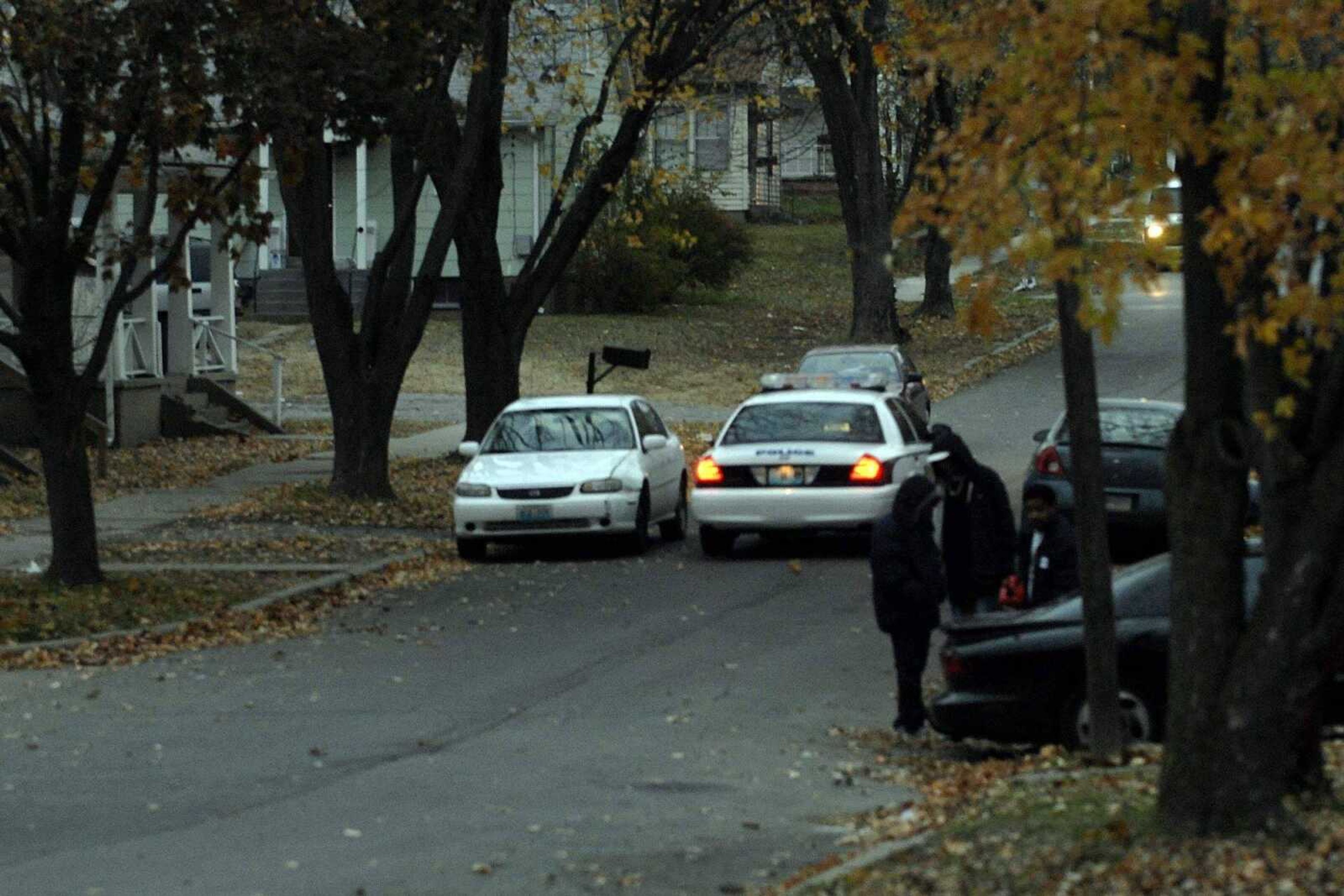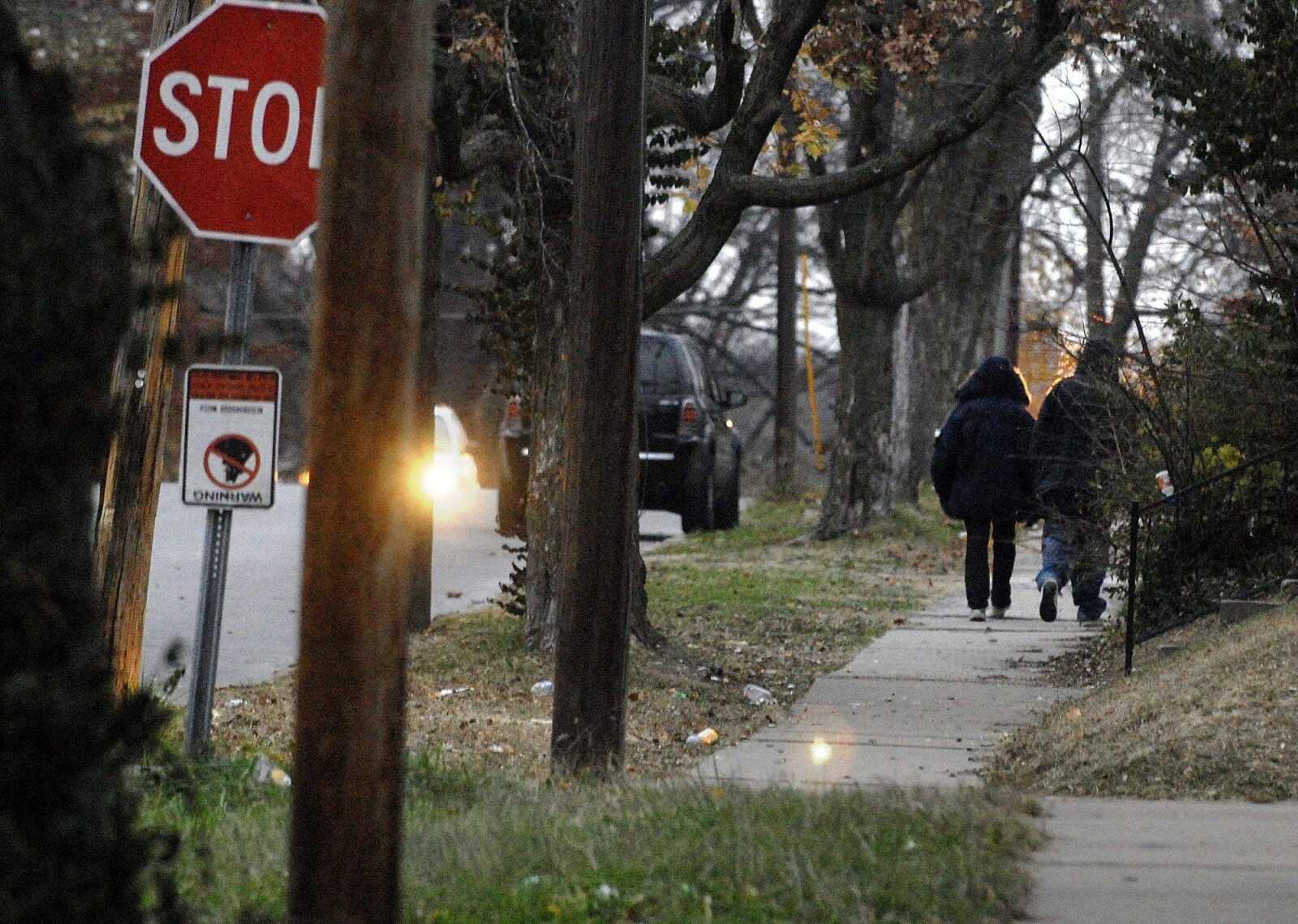Future of Hanover Street, site of recent shootings, in the hands of those who live there, say police and residents
At the sound of gunfire Nov. 2, everyone in Harold Bays' Hanover Street home raced to the basement. When he was sure his wife and three children were safe, he ventured upstairs and outside to see what happened. A bullet-riddled car was parked in front of his home. Police were searching for a wounded man. When a TV news report on the shooting aired with his house in the background, Bays said, he received frantic phone calls from his mother and mother-in-law...
At the sound of gunfire Nov. 2, everyone in Harold Bays' Hanover Street home raced to the basement. When he was sure his wife and three children were safe, he ventured upstairs and outside to see what happened. A bullet-riddled car was parked in front of his home. Police were searching for a wounded man. When a TV news report on the shooting aired with his house in the background, Bays said, he received frantic phone calls from his mother and mother-in-law.
Two days later, two more people were wounded in a shooting less than a block away.
When they moved into the brick home a year ago, Bays' children didn't think twice about walking from one room to the next. Now, he said, his two sons, ages 10 and 3, and his daughter, 7, are anxious, avoiding the rooms at the front of their home.
"A bullet don't have eyes. I'm up all times of the night," said Bays, 39. He looks in on his sleeping children, he said, and keeps an eye on the street outside.
South Hanover Street is in trouble, the way Good Hope Street was less than 10 years ago and South Ellis Street was five years ago, according to Cape Girardeau police chief Carl Kinnison.

The future of Hanover Street lies in the hands of those who live on each block, according to everyone interviewed for this story. Not everyone agreed on what the main problem is, though many mentioned drugs, or how to fix it. Some blamed an influx of people from surrounding cities, such as Hayti, Charleston, Kennett, Sikeston and Southern Illinois -- and the lack of sense of community and ownership. Others blamed unsupervised young people or a lack or resources or the bad economy.
Bays' home is a just a few doors from the corner of Bloomfield Street, which separates the 300 and 400 blocks of South Hanover Street. Since Jan. 1, nine shootings have been reported on or near the Hanover-Bloomfield corner.
196 calls this year
Police have responded 196 times to calls for help on Hanover Street this year, making eight warrant arrests and dealing with complaints about drugs, animals, noise and litter violations.
The rise in police patrols since the shootings and the drop in temperatures have helped calm the street, according to Hanover Street residents, but they also say the problems will return when spring comes.
One woman, furious and scared, watched police gathering evidence after the Nov. 2 shooting. "This is a good neighborhood with good people," she insisted, wondering why police weren't arresting the troublemakers.
Charlene Pieper moved to the 400 block in June. She's been told it's too dangerous to walk her three dogs after dark. The neighborhood gets noisy sometimes, Pieper said, and she sees some groups of young people openly smoking marijuana.
Without the dogs, "I think I'd be scared," she said. "It seems like the groups that cause trouble move around a lot ... and throw trash everywhere."
Former police officer Joe Nunly has lived on South Hanover Street for four years. He estimates that 95 percent of Hanover Street's troubles are caused by "kids that have nothing to do."
Across the street, in a cluttered but clean home she shares with her children and grandchildren, a 60-year-old woman voices agreement -- but she won't give her name. She said she's afraid, having seen drug deals on the street. Shortly after moving to her home three years ago, she and her family picked up trash along the street.
"The next day, it'd be there again," she said.
Within her first year living on the street, she saw police raid a neighbor's house, where drugs were found. Like Nunly, she blames many of the problems on children with too little supervision.
"Ever since they stopped parents from whupping their kids' behinds, the kids went wild," said the woman, adding that her own grandchildren have been difficult to control because she works evenings and can't always supervise them.
According to city councilman Charlie Herbst, a former police officer, "nothing for kids to do" is not accurate.
"There is certainly more to do now then there was when we were kids. Family Resource Center, Boys & Girls Club, Salvation Army, numerous churches, Boy Scouts, Girl Scouts, church league basketball, youth football leagues, after-school activities, etc., abound in opportunity. However, for the most part, the people hanging in the streets are doing just that -- hanging in the streets, and up to no good," he wrote in an e-mail.
It's not against the law to gather in a group, he noted.
Invitations to trouble
Bays' brick home is among the nicer houses on the street, most of which were built in the 1930s or earlier. Paint is peeling away from some of the older wood homes. A house near Cousin Street has broken windows and trash spilling out of the open front door. Litter is common, though fallen leaves have covered much of it.
Litter and decay are silent invitations to trouble, according to Cpl. Ike Hammonds of the Cape Girardeau Police Department's training and community affairs section. He is a liaison for the River Corridor Task Force, a community group chartered to develop leadership, as well as a coordinator for the police department's gang resistance education program aimed at elementary and middle school students.
"If you can't address the small things, they will grow, and the whole time, you're sending a message: 'I don't care,'" he said. An abandoned home will be the target of rocks, he said. A broken window leads to more vandalism, home invasion, squatters and more problems.
The worst crimes are tough to solve in a "no snitching" culture that has evolved over the past decade, according to Kinnison. The victims of shootings this month, for example, resisted answering police questions. After a police officer was assaulted in front of as many as 60 people July 4, 2005, none would testify.
One way police are trying to change the neighborhood is by what Kinnison and Hammonds called community policing. This involves assigning the same officers to patrol areas and encouraging them to get out of the patrol cars to visit with people, Hammonds said. With familiarity, he said, more trust is possible between residents and officers.
John Wade, a professor of criminal justice at Southeast Missouri State University, said any one person can change the neighborhood by taking a leadership role. But criminals won't concede to residents' first efforts, he said.
Bays said he believes the increased police presence has helped, but he knows police can't be there all the time. He initially declined to give his name for this story, then changed his mind after being asked what will fix Hanover Street's problems.
"People need to step up. We need to stop talking about it and put our feet forward," he said.
While many of those living on Hanover Street say having a recreation center would be a major step forward, Hammonds doesn't quite agree. People who use guns to settle disputes aren't typically those who go to a recreation center, he said, though it would give others a place to be, rather than lingering on a street where they could become victimized.
More good than bad
Hammonds said Hanover Street has more good people living there than bad.
"Hopefully, we can get more people to buy property there and the other element will leave -- not just leave and move to other parts of our city, but leave our city."
Getting to that point, he said, will take better screening of tenants by landlords, a commitment from residents to quickly fix small problems and a willingness to trust police with critical information that could lead to arrests.
"Someone in the community knows what happened, when, where, how. They know. They have to trust us enough to give us the information," he said.
People can share anonymous tips on crimes anywhere in the city by calling the Cape Girardeau Police Department at 335-6621 or CrimeStoppers, which offers cash rewards for information leading to an arrest, at 332-0500.
"We can get [CrimeStopper callers] paid," Hammonds said. "I don't have to see you, I don't need to know your name. If the information leads to an arrest, we can get you paid."
bdicosmo@semissourian.com
388-3635
pmcnichol@semissourian.com
388-3646
Connect with the Southeast Missourian Newsroom:
For corrections to this story or other insights for the editor, click here. To submit a letter to the editor, click here. To learn about the Southeast Missourian’s AI Policy, click here.








